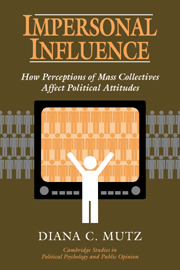Appendix: Methodology
Published online by Cambridge University Press: 05 June 2012
Summary
Since cognitive responses play such a prominent role in understanding the influence of mass opinion cues in these experiments, it is important to have confidence in these particular measures. The thought-listing questions made the transition from the laboratory to a telephone survey fairly easily. But how confident can one be that the thought-listing measures truly tap the extent of respondents' internal dialogue that occurs before expressing a choice of candidate? Past research on the use of thought-listing questions has examined both reactivity and rationalization as potential problems with measures of this kind. In this study, respondent preferences purposely were assessed before eliciting cogitive responses in order to prevent possible reactivity (Cacioppo and Petty 1981). It is still possible, however, that the cognitive responses represent nothing more than post hoc rationalizations of candidate preference; for example, candidate support cues could influence feelings toward a candidate (for reasons unrelated to cognitive response), and these new attitudes could, in turn, influence cognitive responses as respondents attempt to construct a line of reasoning after the fact.
Path analytic studies of cognitive response measures generally have concluded that cognitive responses mediate affective responses rather than the other way around (Cacioppo and Petty 1981). Findings specific to these particular studies also suggest a mediating role for cognitive responses in influencing attitudes; in all of the studies, the interaction between cognitive elaboration and the direction of the experimental cues indicates that the cues were effective only when accompanied by thought rehearsal.
- Type
- Chapter
- Information
- Impersonal InfluenceHow Perceptions of Mass Collectives Affect Political Attitudes, pp. 297 - 300Publisher: Cambridge University PressPrint publication year: 1998



